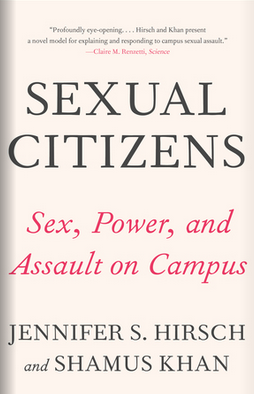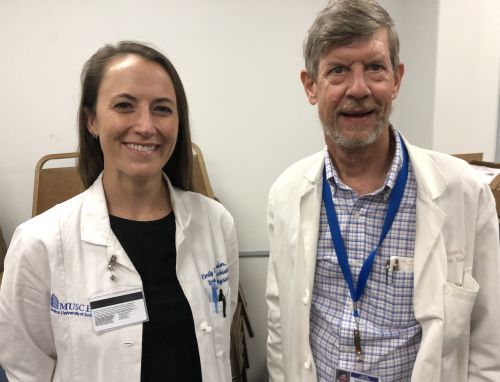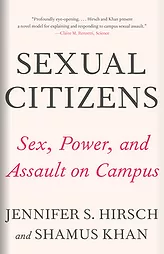
Sexual Citizens: A Landmark Study of Sex, Power, and Assault on Campus
by Jennifer S. Hirsch and Shamus Khan
New York: WW Norton & Co; 2020
Dr. Higgins:
College today is not your grandfather’s alma mater. The landmark study, Sexual Health Initiative to Foster Transformation (SHIFT), has generated a ton of data reported in over 20 scientific journals (not including book chapters)—none of which have appeared in psychiatric literature. Fortunately, this large study of sexual behavior at Columbia University and Barnard College is available in many formats, including audiobook and Kindle. The research in Sexual Citizens: Sex, Power, and Assault on Campus by Jennifer Hirsch and Shamus Khan analyzes 1600 students in a variety of ways. They convened focus groups, paid students to keep daily diaries, along with sending dedicated graduate students to do campus fieldwork, eg, observing frat parties with piercingly loud music and sticky floors.
The study included extensive qualitative research (which they call ethnographic research) gathered from one- to three-hour, in-depth interviews, with 151 students about their sexual experiences on campus. These stories are the backbone of the book which the authors use to describe problems and propose solutions.
The first chapter alone presents 15 cases that are woven into a story describing a spectrum of sexual assaults—from abject rape to persistent coercion. Despite this, the book is difficult to put down. The archetypal case involves a freshman, excited to be on her own, wanting to be socially intimate, who is not prepared for the intoxicating effects of excessive alcohol and the predatory nature of senior men. Some cases entail aggressive forced sex while most are verbal and emotional manipulation which both parties might not recognize as assault. Regardless of the definition, the victim feels violated, humiliated, and devalued . . . and frequently has never discussed their experience.
The authors state the book is written for parents, but the stories have opened my eyes to the hidden, unspoken world of power and sexual assault. It has changed the way I interview patients. Furthermore, it’s made me rethink my own sexual communications.
Dr. Whisler
The approach we take in psychiatry is often reactionary, discussing traumas after the fact, or monitoring for sexual side effects of medications. In clinical life, authentic connection often relies on the ability to engage in painful topics comfortably and directly. Many of us labored through questions regarding suicidal ideation during intern year, only to find after repeat encounters it was not only tolerable, but with the right approach, the conversation was welcome. Sexual development and romantic relationships are a vital part of growing into self-actualized adults and contribute to global wellness. Sexual Citizens offers many powerful lessons, chief among them the provision of a new language with which to conceptualize the sexual lives of college students.
Sexual Citizens outlines three concepts through which to evaluate students’ sexual experiences. The first, a sexual project, is what students hope to get from sex at college. Interestingly, it is not always as straightforward as one might assume, as students provide reasons far beyond just pleasure or intimacy. The second, sexual citizenship, is the dual respect for one’s own sexual autonomy as well as that of others. The third, sexual geographies, describes how physical spaces influence sexual choices.
Each story told within this book is viewed through the lens of one or more of these concepts, though disregard for sexual citizenship seemed ubiquitous. The lesson is grim; our society’s failure to support sexual development is a likely contributor to high rates of assault. It does so in ways that are obvious; victims had often not been empowered with the ability to say no or the belief in their right to prioritize their safety over the other party’s comfort. More insidious means were also identified; perpetrators had often not been challenged to develop from the self-absorption of adolescence and thus failed to recognize the person across from them as a person with their own hopes and needs.
The authors give a brief overview of social policy, noting abstinence-only education has been a hallmark of presidential actions since the Reagan era. This fear-based approach denies the sexual citizenship of young people and precludes the opportunity to learn about bodies and relationships in a healthy and fulfilling way. Most students interviewed did not have experiences of adults providing positive, supportive information on sexual development or the role sex might have in their lives. When all that is taught is to “say no,” how can we learn what we value, how to discuss needs, or even to respect those with whom we might engage? The question is asked “What if, instead of scaring young people, we helped them grow into people who have satisfying intimate lives?”
The book ends with several possible interventions. Notably, the authors differentiate between sex education and sexual socialization. The former is what we currently rely on, and which is woefully inadequate. Sexual socialization on the other hand is “the responsibility of families and communities.” Sexual Citizens presents a well-crafted study that, without shame, addresses what I have heard in whispers from friends throughout my life. I believe the lessons taken will guide me in helping future generations avoid needing to share those same whispers.
 Dr. Whisler is a Child & Adolescent Psychiatry Fellow, Stanford University School of Medicine. Dr. Higgins is Affiliate Associate Professor, Psychiatry and Behavioral Sciences, Medical University of South Carolina.
Dr. Whisler is a Child & Adolescent Psychiatry Fellow, Stanford University School of Medicine. Dr. Higgins is Affiliate Associate Professor, Psychiatry and Behavioral Sciences, Medical University of South Carolina.

_-The-Breakthrough-Antipsychotic-That-Could-Change-Everything.webp?t=1729528747)



